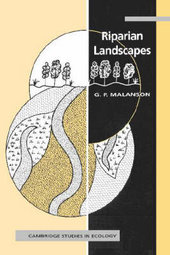
|
Riparian Landscapes
Paperback / softback
Main Details
| Title |
Riparian Landscapes
|
| Authors and Contributors |
By (author) George P. Malanson
|
| Series | Cambridge Studies in Ecology |
|---|
| Physical Properties |
| Format:Paperback / softback | | Pages:308 | | Dimensions(mm): Height 228,Width 153 |
|
| Category/Genre | Ecological science
Applied ecology |
|---|
| ISBN/Barcode |
9780521566834
|
| Classifications | Dewey:574.5222 |
|---|
| Audience | | Tertiary Education (US: College) | | Professional & Vocational | |
|---|
| Illustrations |
5 Tables, unspecified; 27 Halftones, unspecified; 17 Line drawings, unspecified
|
|
Publishing Details |
| Publisher |
Cambridge University Press
|
| Imprint |
Cambridge University Press
|
| Publication Date |
18 April 1996 |
| Publication Country |
United Kingdom
|
Description
Riparian Landscapes examines the ecological systems of streamside and floodplain areas from the perspective of landscape ecology. The author describes the specific spatial pattern of riparian vegetation as a result of, and a control on, the ecological, geomorphological, and hydrological processes that operate along rivers. He also discusses the role of the riparian zone in controlling species distribution and abundance and highlights the intelligent management of these valuable ecological resources. Finally, Malanson explores the potential for linking hydrological, geomorphological and ecological simulation models.
Reviews'The book is well structured, with good scene-setting introductions to each chapter ... its clear layout and the useful chapter summary and conclusion paragraphs would make it useful reading for undergraduates looking into riparian ecology ... Riparian Landscapes gives a comprehensive perspective on the dynamics of ecology and landscape response along rivers.' Pauline Kneale, Circulation 'What Malanson contributes ... in this valuable work is a detailed analysis of the ecological and hydrological structure and dynamics of riparian ecotones ... well worth the price ... and is required reading for all those interested in riparian landscapes.' Journal of Biogeography
|